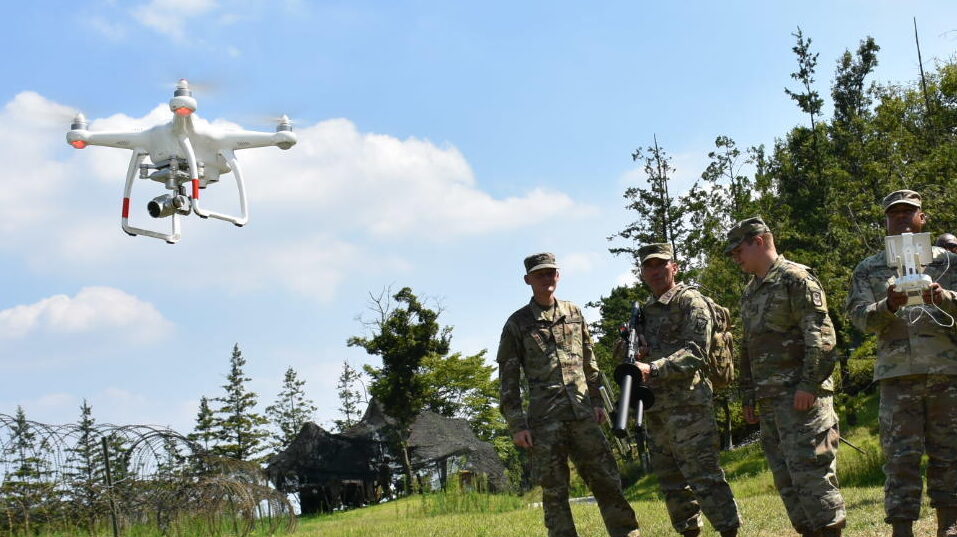
A Virginia Congressman is asking the Army to create a drone corps as a formal training branch, on par with traditional specialties like artillery and intelligence. But Army leaders aren’t buying it.
In a proposed addition to the national defense policy bill for fiscal year 2025, Congressman Rob Wittman (R-Virginia) envisions an official drone corps and training center, a similar structure long in place for most Army specialties. The new corps would serve as the Army’s primary organization for programs and projects with small and medium unmanned aircraft and counter-UAS systems. The bill also calls for the creation of an Army Electronic Warfare Center of Excellence to handle policy, training and doctrine.
But Army leaders appear resistant to the idea. Rather than dedicating a separate branch to drones, Chief of Staff Gen. Randy George told the Senate Armed Services Subcommittee on Defense on Tuesday, the Army wants drone technology to be “resident in every formation, at every echelon.”
“We don’t see this as integrated into our formation, not some separate piece. I think we need that kind of flexibility,” he said. “I don’t think it would be helpful to have a separate drone branch.”
A spokesperson for Army Training and Doctrine Command, which would be the administrative home of drone corps, said there are now various programs and training with drones and electronic warfare, or EW, happening across different parts of the Army “based on specific mission and needs of the soldiers.”
At Fort Stewart, for example, officials hired a private company to train 3rd ID brigades in counter-UAS techniques against drone swarms before soldiers headed to a rotation at a Combat Training Center.
In fact, George told lawmakers, three brigade-sized units that are preparing to deploy to both Europe and the Pacific are already using drones, electronic warfare and counter-UAS capabilities.
“We’re doing what we’re calling transformation in contact,” he said, adding that the idea is to ”infuse a formation with technology, and then see how they actually use it.”
Proposed Changes
The measure was adopted by the House Armed Services Committee on Wednesday. The proposal will need to pass the rest of the House and Senate before it may become part of the final version of the defense policy bill.
“A drone corps may better lend itself to allowing the broad array of expertise required to mature within the Army and for these systems’ unique capabilities to grow beyond their role primarily as enablers to the current combat arms branches,” Wittman said at a hearing on Army modernization plans in March.
The issue has long been on the mind of Wittman, chair of the HASC Subcommittee on Tactical Air and Land Forces, who argued in a 2020 op-ed that the Army needed better EW and counter-UAS capabilities. On Wednesday, he doubled down on his drone corps proposal, saying that it “seeks to elevate Army electronic warfare from organizational misalignment.”
“It is clear that the Army leadership needs better inspiration and a renewal of the thought as they prepare our Army for the quickly evolving future of conflict,” he added.
Under the proposal, the drone corps would act as a command center for Army drone operations by helping to integrate drones with forces that “have not traditionally used such aircraft and systems,” conducting research, providing specially trained personnel and developing capabilities to counter adversaries. The organization would be led by a Drone Corps Chief, appointed by the Army Secretary, according to the legislation.
Currently, leadership under TRADOC’s Combined Arms Center and the Army Cyber Center of Excellence are tasked with integrating cyber and EW throughout service and establishing the standards for Army doctrine, operations, and training. Separately, Army Forces Command, FORSCOM is the entity responsible for “training, mobilizing, and deploying combat ready” forces with new technologies.
It’s unclear how the measure would change their current responsibilities.
In addition to the drone corps, the measure also calls for the creation of an Army Electronic Warfare Center of Excellence within TRADOC, similar to the doctrine centers at the heart of branches like fires, aviation and other jobs. The center would be in charge of drafting doctrines, providing individual and certification training, developing facilities and manuals on technical aspects and field use.
Army Under Secretary Gabe Camarillo also signaled resistance to the drone corps idea during a think tank event last week. Wittman’s proposal, Camarillo said, could undercut current efforts across the Army to understand where and how to use drones. Instead, he said, that soldiers need to experiment so that the Army can understand how drones affect “the way that our formations will fight.”
“Having a branch or a [Center of Excellence] or anything like that, it’s not going to help us buy anything faster, or get us more resources against the problems,” Camarillo said.
According to the proposed legislation, the Army would have a year to transfer electronic warfare-related programs, projects and activities currently under the Cyber Center of Excellence to the new EW center.
